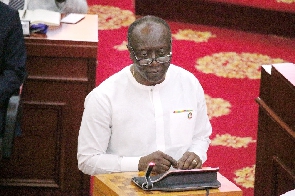 Finance Minister, Ken Ofori-Atta
Finance Minister, Ken Ofori-Atta
The Finance Minister, Ken Ofori-Atta, has disclosed that government has commenced processes to consolidate three public tertiary institutions into a new university, to be known as the National Institute of Communication and Media Arts.
Mr. Ofori-Atta, presenting the 2019 budget statement in Accra, said the Ghana Institute of Journalism (GIJ), Ghana Institute of Languages (GIL), and the National Film and Television Institute (NAFTI) are to be merged into the single university.
According to the minister, next year the necessary regulatory bill will be put together with stakeholder consultations.
“Mr. Speaker, processes have also commenced to merge the Ghana Institute of Languages, National Film and Television Institute (NAFTI) and Ghana Institute of Journalism (GIJ) into the National Institute of Communication and Media Arts. In 2019, the necessary regulatory bill will be put together with stakeholder consultations,” he said.
Mr. Ofori-Atta told Parliament that the move to merge the three institutions forms part of government’s commitment to expand tertiary education opportunities to meet increasing demand and the skill needs of the country.
All three tertiary institutions are under the Ministry of Education, with two of them – GIJ and NAFTI – running degree and post-graduate programmes while GIL runs professional and HND programmes.
Of the three institutions, only GIJ has been granted a Presidential Charter to award its own degrees, diplomas and certificates for programmes accredited by the National Accreditation Board, while NAFTI does so due to its affiliation with the University of Ghana.
To merge or not
With about 72 private tertiary institutions in the country, and more in the works, questions have been raised about the suitability of courses and financial viability of the relatively small institutions.
The decision announced by the Finance Minister highlights the viability of relatively smaller educational institutions – the majority of which are private ones – to survive the test of time, while some others view the proposed National Institute of Communication and Media Arts as the way to go.
The Vice-Chancellor of the University of Ghana, Professor Ebenezer Oduro Owusu, in an earlier interview with the B&FT said the majority of private universities lack the capacity to operate independently – saying struggling ones should merge and ensure quality in the country’s education system.
“If some of the private universities which lack the capacity merge to make sure we bring quality to the system, it will be in the right direction. Because the intent is to make money, it is business as usual. But on the flipside of it, we should also think about quality. The products that will come out of university should be able to fit into the job market.”
He added that the supervising authorities ought to ensure that quality is not compromised. “I wish the National Accreditation Board (NAB), National Council for Tertiary Education (NCTE) would restore the level of quality in many universities, and not allow just anybody at all to establish a university,” Prof Owusu said.
Mr. Kwame Dattey, Executive Secretary of NAB, in an earlier interview told B&FT the board will bring a policy that requests promoters of new university institutions to submit financial guarantees from banks and insurance companies, to ensure completion of enrolled students in case the institutions encounter financial difficulties.
In that policy, the Board wants potential investors into university education to prove financial sustainability and guarantee continuity for the institution.